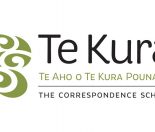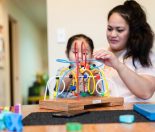Early Intervention is support designed for young children from birth, or from the time they are identified as having special educational needs through to their attending school.
Parents are usually the first to notice that their child may not be developing at the same rate as children around them. It may also be that a neighbour, another family member or family friend notices differences in development, but is apprehensive about voicing these concerns with you. It can be frightening to admit to yourself that there may be an issue with the stage your child is at. Asking for confirmation of your concerns may also be hard. Some of the people you can turn to in this situation include:
- Your family doctor
- A Plunket Nurse
- Parents as First Teachers (PAFT) educator
- Early Childhood Education Centre
- Group Special Education (GSE)
If concerns are raised and it is felt there is a need for a child to receive support, then it will be suggested to the parents/caregivers that they make contact with the Ministry of Education Special Education (GSE) office.
Early intervention support is given not only to the child with special needs, but also their family and any early childhood centre (ECE) he or she may attend.
What is Early Intervention?
Early intervention is the providing of learning support to children before they reach school age.
A team of specialists and support staff from GSE (Group Special Education) work with the child, their family/whanau, and educators at any centre or service they may attend, and any other specialists involved in the child’s care to strengthen his or her learning. The team works with the child until he/she is settled into school.
This learning support takes place:
- at home
- at ECE settings – kindy, kohanga reo, daycare and so on
- as children start school.
Who are the people who provide Early Intervention support?
The people who make up the Early Intervention teams all have in-depth knowledge and understanding of early childhood development and milestones. They are people from a wide range of disciplines and include:
Speech-Language Therapists
Speech-Language Therapists work with children who have difficulty
1. understanding what is being said to them by others and
2. making themselves understood by others.
These children may also have problems forming meaningful sentences and understanding the meaning of words.
A speech-language therapist will assess the needs of a student and develop an individual programme for the child based on the assessment. He or she will also then give advice and training to the child’s parents and teachers.
Early Intervention Teachers
Early Intervention Teachers play a crucial role in preparing a child with special educational needs and their family for starting and settling into school.
One of the roles the Early Intervention Teacher plays is helping parents/whanau fill out paperwork, talking to them about the choices they have when it comes to the schooling of their child, and organising school visits. He or she will visit the school with the family if they feel or find they need his/her support.
A child is usually referred to an early intervention teacher by a health or early childhood education service provider, such as a doctor, Plunket nurse, kindy or playcentre staff member, or someone who has known the child from when they were a baby.
Once a referral has been made the teacher liaises with all those people already involved in the child’s care and upbringing and begins the process of observing and assessing the child’s needs in both the one-on-one, early childhood service and home environments.
From this he or she creates an education programme with strategies relevant to that child and demonstrates how to carry the programme out.
Psychologists
Educational psychologists are employed by GSE, special schools and Accredited Service Providers (ASPs) of early intervention services.
Psychologists mostly work as part of a team of GSE specialists. They work together to support a child or young person with Special Education needs at school and in Early Childhood education.
Educational Psychologists adapt what they do to suit the needs of individual children and young people, the needs of families, whānau, educators and specialists, and to suit the context in which children and young people live and learn.
Advisors on deaf children
GSE employs Advisers on Deaf Children to help families understand their child’s hearing loss. They support and guide parents as they learn to deal with their child’s deafness and help them consider the technology and communication options available.
Advisors on Deaf Children also provide assessments and information about a child’s development and behaviour to other professionals working with the family.
Resource Teachers: Vision
The Resource Teacher: Vision is given the responsibility of assessing how a child with vision impairment is functioning visually at home and in the early childhood education setting. They assess what the child is able to do and not do with the vision they have. This information is then passed on to parents and teachers in order that they can better plan what special assistance and resources the child may need.
Resource Teachers: Vision work with infants on an individual basis while also working closely with other involved professionals and parents as part of the early intervention team.
Resource Teachers: Vision have an important role with infants and toddlers in providing access to the learning environment.
Kaitakawaenga (Māori liaison advisors)
Māori Liaison Advisors work alongside special education specialists helping to provide culturally-appropriate services to Māori children and young people, and their whānau and educators.
Part of the Māori Liaison Advisor’s role is to talk with whānau about special education and GSE and to ensure they are comfortable before they meet with the specialists who will be supporting them and their child from that point on.
Often the Māori Liaison Advisor will meet with the whānau before they meet with any other agency or professional. From that point on, the advisor remains the key point of contact within GSE for the whānau.
Māori Liaison Advisor – as part of a wider team – helps to develop, implement, monitor and review the education plans for children. Talking to groups of people who work with children with special education needs such as teachers, whānau and representatives from volunteer and government agencies is another part of the role.
Education support workers
An Education Support Worker works alongside educators to develop and implement children’s education programmes. This means providing one-on-one support to each child to enable them to take part in the education they receive within their early childhood service.
This person works to build relationships with staff, children, families and whānau to help the child with special needs to learn and achieve their potential.
They support the child by encouraging them to take part in activities and lessons, keeping notes on progress for the teacher at the service, allowing the child to learn safely by being physically present when they are needed and so on.
How does the Early Intervention Team provide this support?
Early intervention is provided in a number of ways. The learning support of a child may include:
- an assessment of your child’s skills and education needs;
- planning, such as helping put in place an individual plan for your child, outlining relevant teaching practices, any specialised equipment required, short-term and long-term social and learning goals, timeframes, and at-home follow-up activities;
- general information and support to families, educators and other professionals. Your early intervention key worker will tell you about the range of services available to your child, give you advice on finding an early childhood education setting and help with the transition to school;
- expertise and knowledge-sharing, such as designing ways to improve socialisation, learning, communication and behaviour management;
- specialist services, such as speech-language therapy and specialist teaching;
- education support workers, who support specialists and early childhood educators and work with your child.
Information sourced from NZ Ministry of Education
Helpful websites
Ministry of Education Special Education





